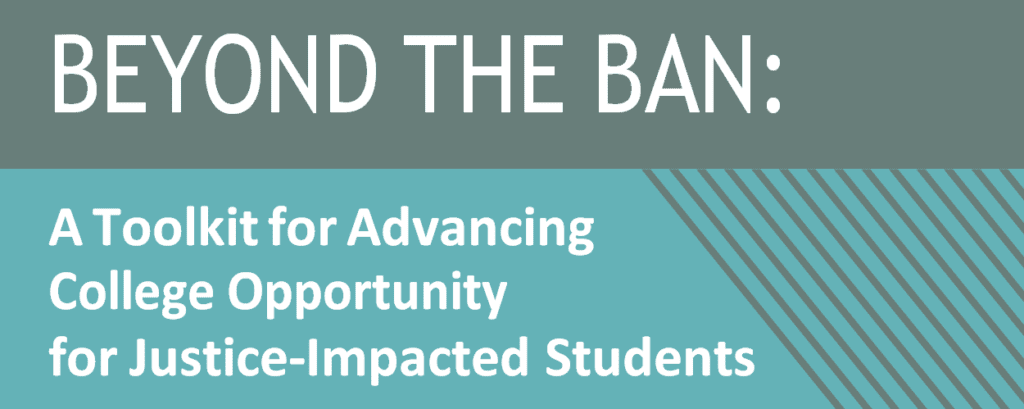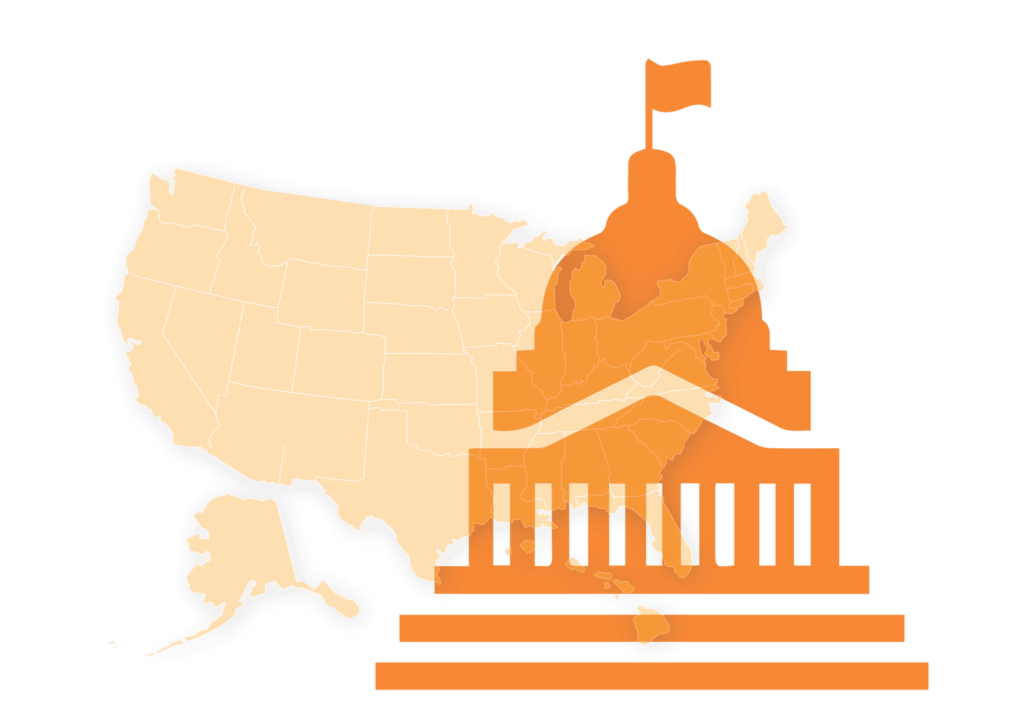New policy toolkits in eight states examine the extent to which some states impose barriers on justice-impacted students
WASHINGTON – The United States is home to 2.12 million people who are incarcerated, which is the highest incarceration rate in the world. While criminal justice reform policies aim to reduce this, reentry remains a challenge. The currently incarcerated and reentry population must be set up for success, and having access to educational opportunities while incarcerated and access to education upon release is key. But have state leaders made efforts to remove barriers for students who are justice-impacted? Not really, according to “Beyond the Ban,” a collection of new state policy toolkits for advancing college opportunity for justice-impacted students created by The Education Trust and the inaugural cohort of Justice Fellows.
Ed Trust researchers and the Justice Fellows conducted comprehensive policy scans in eight states with the highest concentrations of incarcerated individuals — California, Illinois, Louisiana, New York, Michigan, Ohio, Tennessee, and Texas. The policy toolkits examine states’ policies and barriers for currently and formerly incarcerated people. The toolkits also provide advocacy tools and resources for those pushing for change.
“There are thousands of people who are currently and formerly incarcerated that are deserving of and ready for a college education. Yet too many people are locked out of critical learning opportunities,” said Kayla C. Elliott, Ph.D., director of higher education policy. “They deserve unfettered access to a quality, affordable higher education, which brings tangible benefits for themselves, their families and communities, and society overall.”
The benefits of a college education are well documented. It gives currently incarcerated students hope and a path to a good future during reentry. Likewise, a college education dramatically cuts down on recidivism, housing insecurity, and unemployment rates. These programs also have bipartisan support at the federal level, and the Biden administration announced last summer that the Second Chance Pell initiative would be expanded. Yet many states are lagging when it comes to creating better policies to support this population.
The policy toolkits examine eight key considerations in each state:
- Does the state offer state financial aid to students who are currently and formerly incarcerated?
- Does the state provide sentence reduction credits to students who are incarcerated for enrolling in higher education courses?
- Does the state provide incentives and resources to colleges to enroll and support students who are currently and formerly incarcerated?
- Does the state have a streamlined process for students who are currently and formerly incarcerated to access documents to retrieve their state identification?
- Does the state allow students who are currently and formerly incarcerated to access public housing and housing choice vouchers (formerly Section 8), Medicaid, and the federal Supplemental Nutrition Assistance Program (SNAP)?
- Does the state ban higher education institutions from asking about criminal history on admissions applications?
- Does the state ban employers from asking about criminal history on job applications?
- Do individuals who are currently and formerly incarcerated have the right to vote in the state?
The data shows that none of the analyzed states is doing enough to support justice-impacted people’s access to a higher education and reintegration into society.
This inaction is disproportionately hurting Black and Latino communities. Due to a combination of factors — including systemic injustice, housing segregation, exposure to crime and violence, under-resourced schools, over-criminalization, bias in the criminal justice system, harsh school discipline, and criminal sentencing policies — Black and Latino people and individuals from low-income backgrounds are vastly overrepresented in the U.S. prison system.
Ed Trust and the Justice Fellows urge state policymakers to take the following steps, which would help remove barriers to successful societal reintegration for justice-impacted students:
- Rescind all barriers that prevent students who are formerly and currently incarcerated from receiving state financial aid.
- Allow students to earn equivalent good-time credit, as they do for participating in other correctional rehabilitative programs.
- Provide resources and supports to institutions that enroll justice-impacted students.
- Implement a streamlined process for incarcerated students to retrieve their birth certificates, state ID, and driver’s license.
- Make individuals who are formerly incarcerated eligible for state and federal programs that provide support for basic needs such as food, housing, and health care.
- Ban public and private colleges and universities from asking about criminal history on initial admissions applications.
- Ban public and private employers from asking about criminal history on initial job applications.
- Give currently and formerly incarcerated individuals the right to vote.
“After serving 19 years in prison, I had two goals: becoming a parent and graduating from college. I never thought that I would be denied an education. States like Louisiana make it hard to even find out what resources are available for people who are formerly incarcerated, and even harder to get support”, said Montrell Carmouche, Ed Trust Justice Fellow and Safety and Freedom Fund Director at Operation Restoration. “ We call on state leaders to earnestly review their state’s data and change their policies to give more justice-impacted individuals the resources needed to reintegrate fully into society and ultimately live a life of their choosing,” said Carmouche.
The Beyond the Ban toolkits also include key program and policy information for incarcerated and formerly incarcerated students, as well as guidance for the advocacy community on pushing policymakers to act.
###






 June 30, 2021 by
June 30, 2021 by